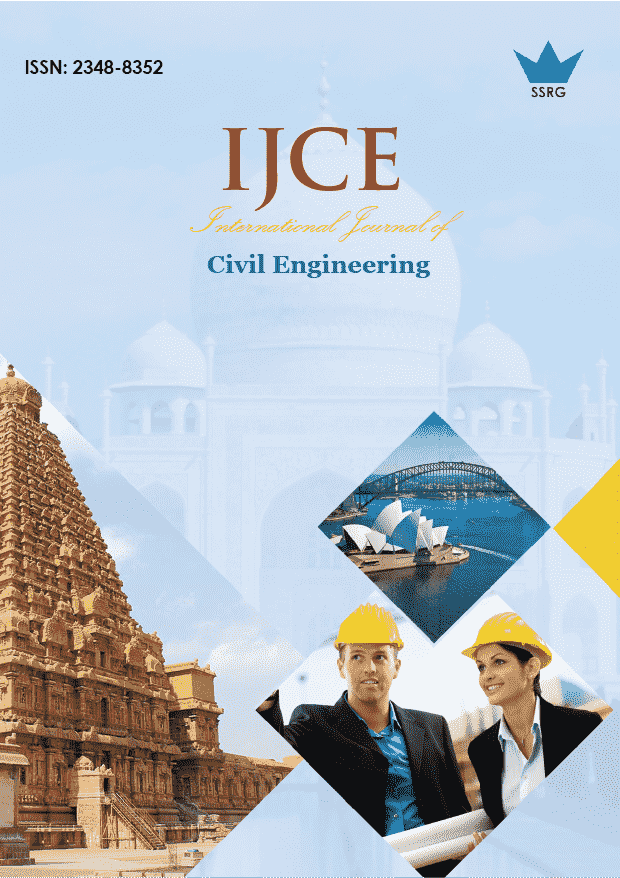A Review on Durability Studies of Geopolymer Concrete and Mortar under Aggressive Environment

| International Journal of Civil Engineering |
| © 2017 by SSRG - IJCE Journal |
| Volume 4 Issue 5 |
| Year of Publication : 2017 |
| Authors : Sara banu. J, Dr.Kumutha. R, Dr.Vijai. K |
How to Cite?
Sara banu. J, Dr.Kumutha. R, Dr.Vijai. K, "A Review on Durability Studies of Geopolymer Concrete and Mortar under Aggressive Environment," SSRG International Journal of Civil Engineering, vol. 4, no. 5, pp. 19-22, 2017. Crossref, https://doi.org/10.14445/23488352/IJCE-V4I5P108
Abstract:
Concrete prepared with Ordinary Portland Cement (OPC) is well known in the world for its reliability durability and versatility. OPC concrete is the second most used material next to water. Even though OPC is so popular in construction, it is not eco friendly due to enormous energy consumption in its production and due to emission of enormous CO2. This is posing a serious challenge in sustainable development. Efforts are needed to develop a environmental friendly civil engineering construction material for minimizing emission of green-house gases to the atmosphere. The Endeavour to develop a environment friendly concrete had offered many alternatives. One eminent among them is geopolymer concrete. This paper presents a review summary of detailed literature survey conducted on geopolymer concrete. In geopolymer concrete, the inorganic alumino-silicate polymer gel synthesized from source materials rich in silicon and aluminium, such as low calcium (class F) fly ash, Ultra-Fine GGBS, High calcium Fly ash, M-Sand and Fly Ash , Recycled Aggregates and Metakaolin and GGBS which binds the loose aggregates, and other un-reacted materials in the produced geo-polymer mix. Geopolymer cement, because of it environment friendly nature becomes a most suitable alternative to OPC. This is because, with the usage of geopolymer cement, Portland cement can be dispensed with in making concrete. This paper briefly reviews the durability studies such as resistance to acid, high temperature, resistance to sulphate and chloride of geopolymer concrete.
Keywords:
Geo-polymer, Durability, Elevated temperature, Sulphate attack, Chloride attack.
References:
[1] Chandan Kumar, Krishna Murari and Sharma, C.R., “Performance of GeopolymerConcrete at Elevated Temperature and Against Aggressive Chemical Environment”. International Journal of Innovative Research in Science, Vol. 3, Issue 6, ISSN. 2319-8753, June 2014.
[2] Satpute Manesh, B., Wakchaure Madhukar, R., and Patankar Subhash, V., “Effect of Duration and Temperature of Curing on Compressive Strength of Geopolymer Concrete”. International Journal of Engineering and Innovative Technology (IJEIT). Vol. 1, Issue 5, pp. 152-155, May 2012.
[3] Daniel, L.Y., and Sanjayan, G., “Effect of elevated temperatures on geopolymer paste, mortar and concrete”. Cement and concrete Research, pp. 334-39, February 2010.
[4] Bakharev, T., “Geopolymeric materials prepared using class F fly ash and elevated temperature curing”. Cement and concrete research. Vol. 35, Issue 6, pp. 1224-1232, June 2005.
[5] Balagur, P.,and Kurtz, S., “Geopolymer for repair and rehabilitation of reinforced concrete beams”. Geopolymer institute report, 1997.
[6] Tang, L., Shi, X.S., Wang, Q.Y., and Huang, Q., “Research on resistance to sulfates of fly ash based geopolymeric recycled concrete”. 23rd Australasian Conference on the Mechanics of Structures and Materials, Vol. 1, pp. 273-280, December 2014.
[7] Bhagia Maria Joshy and Dr. Mathews M Paul., “Resistance to sodium sulphate and sodium chloride attack of fly ash based geopolymer concrete”. Transactions on Engineering and Sciences, Vol. 2, Issue 10, ISSN. 2347-1875, October 2014.
[8] Kumaravel, S., and Girija, K., “Acid and salt resistance of geopolymer concrete with varying concentration of NaOH”. Journal of Engineering Research and Studies, ISSN. 0976-7916, December 2013.
[9] Neetu Singh, Sameer Vyas, Pathak, R.P., Pankaj Sharma, Mahure, N.V., and Gupta, S.L., “Effect of Aggressive Chemical Environment on Durability of Green Geopolymer Concrete”. International Journal of Engineering and Innovative Technology (IJEIT), Central Soil and Materials Research Station, Vol. 3, Issue 4, ISSN. 2277-3754, October 2013.
[10] Suresh Thokchom, Partha Ghosh and Somnath Ghosh, “Resistance of fly ash based geopolymer mortars in sulfuric acid”. ARPN Journal of Engineering and Applied Sciences, Vol. 4, Issue 1, ISSN. 1819-6608, February 2009.

 10.14445/23488352/IJCE-V4I5P108
10.14445/23488352/IJCE-V4I5P108